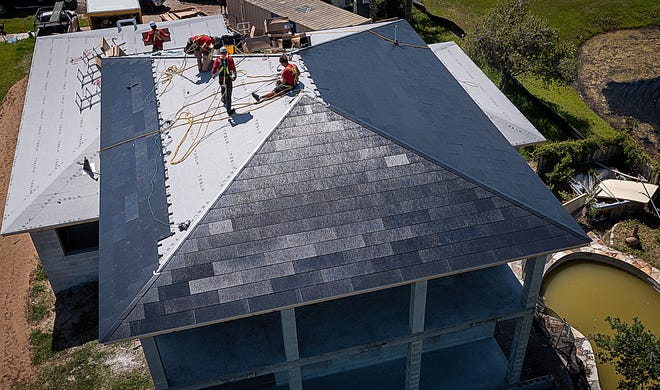St. Augustine’s Bill and Gillian Tait are the first homeowners to install a full Tesla solar-paneled roof in St. Johns County, according to the two Jacksonville-based companies overseeing its construction.
The couple opted to go with the emerging technology for a couple of reasons.
“Well, we wanted solar, for one, because it just makes so much sense,” Bill Taint said in a recent interview with The Record. “And we really just liked the look of the panels.”
The panels — each 15 feet wide by 45 feet long — are linked to a Tesla Solar Inverter and can generate 340 watts, more than enough to power the average household, with the ability to store additional energy in batteries.

The Taits, who previously resided on Anastasia Island, are in the process of building a new home on a waterfront parcel in the St. Augustine Shores.
Tesla is contracting with Parrot Solar and Ron Russell Roofing, both in Jacksonville, for the job.
The solar trend:St. Johns County solar facility part of FPL’s transition to renewable energy
Emerging market:St. Johns County solar project nears operational status
According to Tommy Cusick, owner of Parrot Solar, it is easier and less expensive to install a solar roof in new construction than it is to retrofit one.
Cusick said it is tough to provide cost estimates for Tesla solar roofing systems because every structure is different. Some property owners opt for partial panel systems, while others want full coverage, he said.
But since first being introduced into the market around 2006, Tesla’s proprietary solar technology — now in its third version — has become more efficient and cheaper, driving end-user costs down after the initial outlay.
“We like to say it is the only roof that pays entirely for itself,” Cusick said. “Rather than getting a traditional roof and the investment goes down the day it is installed, it [the Tesla solar roof] is only going to increase in value.”
Average pay-down time is between 12 to 15 years, according to Cusick.
Tesla solar roof systems are several times stronger than standard roofing like shingle tiles or concrete slab and are engineered for weather protection against high winds, hail and major hurricanes.
“We’re relying on Mr. Musk and his guarantee of a 25-year warranty,” Tait said.
As the “Sunshine State,” Florida has a plentiful source of clean energy from which to tap into, and Cusick said his company is seeing an increased interest in solar power across the board.
There is also a coolness factor associated with the look of these modern, shiny black reflective tiles capping a home, as well as the Tesla name itself.
A project unveiled in 2019 in Bonita Springs, Florida, that billed itself as a “home of the future” included a fully tiled Tesla solar roof, the same kind the Taits are getting; a Tesla Powerwall battery to store the solar energy for 24-hour use; and a Tesla Model 3 electric car in the garage which could also be charged up to the system.
